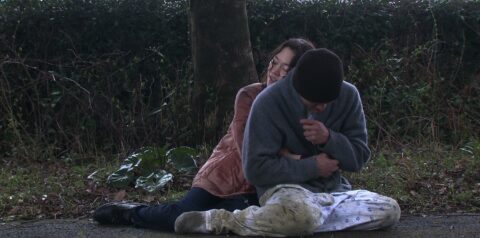Heavy body, awakening from drink: oh, springtime
“A Springtime Evening,” by Kim Su-young (1957)
Movies about alcoholism often suffer from the same problem Truffaut attributed to anti-war movies. Whether it’s Trees Lounge (Steve Buscemi, 1996), Leaving Las Vegas (Mike Figgis, 1995) or, more recently, The Outrun (Nora Fingscheidt, 2024), alcoholism may corrode the soul and debase the body, but oftentimes, popular actors look kinda cool while doing it. Even when things do get very bad, there can be a tragic glamour in alcoholism, wasting away to the bottom of the bottle, showing off your enormous appetite for endless rounds of drinks.
Well, the extraordinarily brutal and powerful Spring Night (Kang Mi-ja, 2024) — adapted from the novel of the same name by Kwon Yeo-sun — doesn’t suffer from this issue. The 40-something Yeong-gyeong’s (Han Ye-ri) penchant for downing bottle after bottle of soju looks utterly devastating. Alcohol is not fun here. Not at all. This is a woman completely frozen in the grip of an unceasing mental disease. Han’s astonishing performance is a perfectly pitched portrait of misery ever-so-slightly tinged with a tragic slice of hope.
Equally nuanced although not quite as brilliant is Kim Seol-jin’s performance as Su-hwan, a similarly-aged man suffering from crippling rheumatoid arthritis. They meet one another at a wedding party, the only two left standing in someone’s living room, and immediately bond over a deep and sustained shared sadness as well as their failed relationships. Her mental illness meets his physical debilitation, offering the chance that together, perhaps they can fill each other’s void.
Through simple camera movements and often unadorned digital images with dark and heavy contrasts, Kang allows for a true actors showcase, easily delivering one of the standout films of the Forum section. It shows that you don’t need expensive equipment or flashy moves to make a great film. Nor do you need to stretch out a tight and compelling 67 minutes for a flabby and pointless 90. You don’t even need a colourist! You simply need something important to say and to find out the best way to say it. Which Kang does.
What’s so compelling is how raw and physical this film is, from Su-hwan carrying the unconscious Yeong-gyeong home to a frankly remarkable bit of performance art as the two drag their respective bodies across a park lane, brought to the floor by their conditions — betraying both actors’ training in dance. These are two people who have learned to deeply care for and accept one another, but are both so broken, finding a solution feels almost impossible.
One gambit in particular fascinates me, most specifically because it has rarely worked on me before. Early on, Kang simply repeats what appears to be the exact same scene twice in a row. What many might see as laziness, I saw as the perfect representation of the cycles of alcoholism, forcing you into the same awful and inescapable pattern over and over again. Coupled with moments of astonishing vulnerability from Han as well as the well-deployed and haunting use of Kim Su-young’s poem “A Springtime Evening1The translation of the poem I found by Brother Anthony of Taizé writes “A Springtime Evening” so I’m keeping the spelling like that here to respect him, although the film translates the poem as “Spring Night.”,” which lends this film its name, and Kang has provided a truly special work of art; an uninterrupted howl of misery laced with haunting humanity.
Redmond is the editor-in-chief of Journey Into Cinema.

